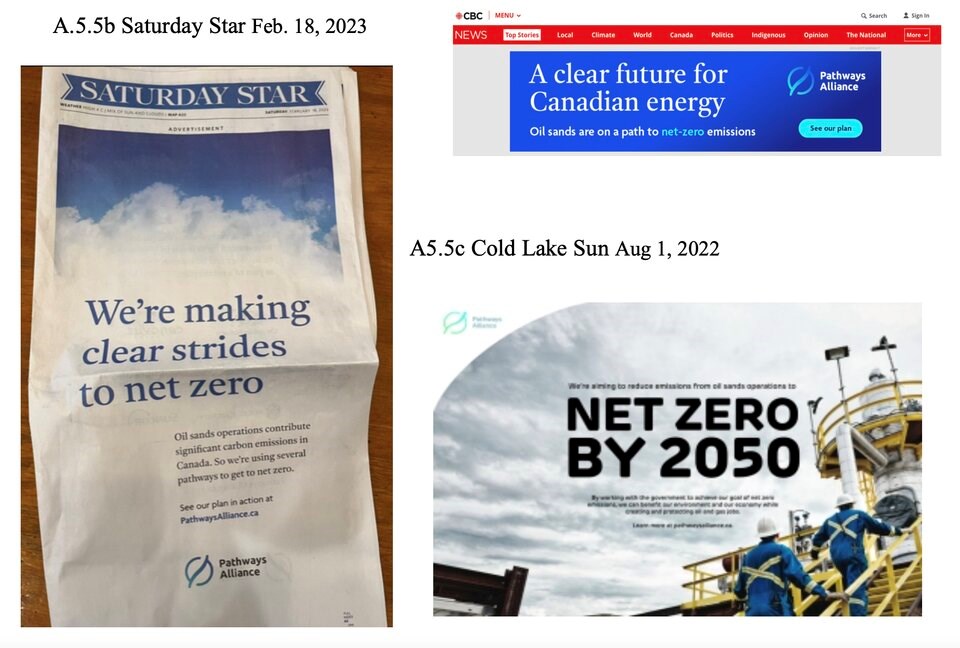A consortium of Canada’s largest oil producing companies has removed content from its website and social media platforms citing a federal bill that introduces stricter enforcement against companies that make deceptive environmental claims.
Bill C-59, which passed a third reading in the Senate on Wednesday and is currently awaiting royal assent, is an omnibus bill that includes amendments to the Competition Act that would broaden the scope of deceptive marketing practices.
New measures would push companies to have better data to back up their claims, and empower individuals to seek a swifter and more transparent decision on alleged greenwashing through a Competition Tribunal, according to Alan Andrews, program director with the law firm Ecojustice.
“This really strengthens the enforcement regime on greenwashing claims,” said Andrews. “The tribunal would have a broad range of penalties at its disposable.”
Andrews said the tribunal would have the ability to penalize companies under three regimes: up to $10 million; three times the value of the benefit derived from the deceptive conduct; or three per cent of the corporation’s annual worldwide gross revenues.
On Wednesday night, those pending legal changes appeared to push the Pathways Alliance to remove all publications from its website and social media channels. The consortium of six oil companies — made up of Canadian Natural Resources Limited, Cenovus Energy, ConocoPhillips Canada, Imperial, MEG Energy and Suncor Energy — says it came together June 15, 2022, “to reduce emissions and achieve net-zero operations.”
A statement on the group’s landing page said uncertainty under the bill pushed Pathways Alliance to remove the content.
“As part of late changes to the omnibus Bill C-59, imminent amendments to the Competition Act will create significant uncertainty for Canadian companies that want to communicate publicly about the work they are doing to improve their environmental performance, including to address climate change,” reads the statement.
“For now, we have removed content from our website, social media and other public communications. This is a direct consequence of the new legislation and is not related to our belief in the accuracy of our environmental communications.”
MC Bouchard, the oil and gas program director at the green think tank Pembina Institute, said the move comes as the Pathways Alliance has failed to make “any final investment decisions on carbon capture projects, or on other technologies, that would meaningfully reduce their emissions” in line with federal targets.
“The oilsands is still Canada’s highest emitting industry, and those emissions continue to grow,” Bouchard said in a statement.
“The actions Pathways and its member companies have taken today appears to be a withdrawal of their commitments to reduce emissions and reach net-zero by 2050," added Bouchard.
Canada’s Competition Bureau is currently investigating the Pathways Alliance’s national “Let’s clear the air” campaign under existing laws.
A Greenpeace Canada complaint taken up by the bureau in May 2023 alleges Pathways Alliance made “misleading” statements in advertisements touting its plan to achieve net-zero emissions by 2050.
The ads ran across television, major Canadian newspapers, their website, podcasts, social media and at least one billboard outside BC Place stadium in Vancouver. The complaint claims those ads failed to account for more than 80 per cent of the emissions released by the consortium of companies’ when their fossil fuels are burned.

At the time, Pathways Alliance said “we strongly disagree with the assertions” in the complaint. The latest statement on its website says the consortium of companies continues to believe the oil industry has “a key role to play” in reducing greenhouse gas emissions and environmental impacts of oil sands production.
The Competition Bureau has taken up a number of complaints alleging deceptive environmental claims in recent years. Bill C-59 represents an attempt by government and the watchdog to strengthen its regulatory hand at a time sustainability claims are becoming more common as companies, charities and non-profit groups look to gain social licence to sell more products and services.
Leah Temper is the health and economic policy program director at the Canadian Association of Physicians for the Environment (CAPE), a group of health professionals that has been involved in filing several greenwashing claims with the Competition Bureau.
In addition to Pathways Alliance, Temper said the Canadian Association of Petroleum Producers has also removed some of its online content, and reporting from the Calgary Herald earlier this month suggested Bill C-59 — and the threats of federal fines for misrepresentations that come with it — was the main reason why the Alberta government’s energy “War Room” was shut down.
“The bill has not even passed yet and we’re already seeing the wide-ranging impact,” Temper said.
“Our hope is that this heralds a new era of corporate accountability for green claims.”


